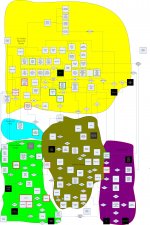Cromulent prose, nicely evocative.
Thanks!
One of my kids is doing modernist literature in her English Lit class, and as an assignment has to write a short story that responds to The Great Gatsby. A good chunk of time yesterday was spent discussing this task at various levels of detail and abstraction, which had put me in the mood to write something in the context of illustrating my point.
There's just not enough detail in any practical fantasy world description to create any significant constraints.
While you might state that it is likely that the Beggar's Guild sends an assassin after you, I argue it is equally just as likely that they don't, or that they offer you a payment to go away, or whatever.
Yes, I agree with this.
An issue that I experienced playing RM was closely related: tables and charts (for events, weather, consequences, etc) that are meant to support a realist/plausible world may tend towards the mundane. But in RPG play one typically doesn't want to centre the mundane! The charts can be distorted in response to this - so instead of being "world representing" charts they become "interesting event representing" charts. But the fairly natural next step from there is to replace the charts with the idea of just
coming up with something interesting that fits the characters and follows from the established fiction.
I've put my point above in terms of charts, but as I experienced it, it tended to generalise across the whole approach to working out what happens next. Once the idea of "fidelity to the mundane because that's what's most likely" is relaxed, the floodgates are open!
When I first started to realise what was going on here, I felt a sort of
guilt or
inappropriateness - because all the "how to GM" material that I was familiar with (Gygax's stuff on setting creation in his DMG; all the RM advice; general prevailing sense of "seriousness'" in RPGing) told me that I should be doing "objective" world creation rather than "spontaneous" situation framing. A concrete example is the following; this is the one that really started to crystallise it for me, I'm guessing around 1995 or thereabouts:
According to my world/event timelines, the Scarlet Brotherhood were going to launch a naval assault by opening a portal (analogous to the 4e D&D 10th level wizard spell Arcane Gate, but much bigger and with a longer duration) that would permit their fleet to cross a long south-stretching peninsular well north of its point, which would permit their vessels to attack with surprise on the less-protected flank of the target region. In my mind, this was visually epic - the huge portal, roiling waters, a fleet of galleys with their weather wizards and war wizards at the prow, etc. I'd talked about it with my housemate who (at that time) was not a RPGer, but liked to follow our game in general terms (I actually got him into a game a few years later, and he is now my BW co-conspirator).
But the focus of actual play, for various reasons including a PC death, had shifted away from the Scarlet Brotherhood and the fate of the southern lands. And so the event was never going to happen "on screen", in a way that would make the PCs part of it. I also became pretty conscious of the fact that, while the visual might be epic, the resolution would be challenging - to do it properly within the confines of RM's system I would have to stat up a
lot of NPCs and vessels, and there would still be so much that was arbitrary and/or would need to be specified on the spot that the actual play would risk either tedium or "GM decides" (and I was already burned in that latter respect by the NPC faction revenge scenario that I've posted about already upthread).
And so I just never operationalised that bit of my timeline. The focus shifted to things further north that the PCs were engaged in. At the time I felt "bad" about this - I was breaking the rule that said that a rich, objective world means sticking to your timeline unless PC action derails it. But it turned out that it didn't hurt anything; the world was just as rich with factions and everything else (the fact that I don't spend table time narrating the Scarlet Brotherhood stuff to the players doesn't mean that I don't spend table time narrating
something else to them); and although that particular campaign came to a somewhat ignoble end after 8 years (due to my inability to mange the increasingly unwieldy fiction using the resources that RM offered me), the failure to follow through on my Scarlet Brotherhood timeline wasn't one of the causes.
The next big RM campaign ran for 11 years, and finished much more successfully. The backstory was sprawling in scope, the factions and their interrelationships as complex as you like, and the relationship of the players and their characters to those factions established at all sorts of levels, from the romantic and intimate, to political and ideological opposition, to being champions in great cosmological struggles. (I've attached the chart that one of the players drew up to track all this: the
black entries are factions/groups that the PCs have defeated/killed.) I needed notes of my backstory to keep track of it; but I didn't need world timelines. I just followed the PCs, and brought things onto the "stage" as they made sense.
My next game after this was 4e D&D (starting in early 2009), and for that I used a pretty similar approach to what I've described in the previous paragraph, but with a more robust mechanical framework. And the world of our 4e game was as rich and plausible as anyone else's, I reckon.



